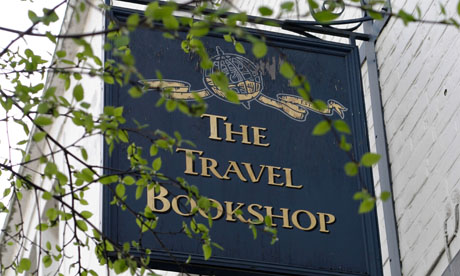The battle to save West London's most famous independent bookshop
How poets, television presenters, actors and novelists fought – via Twitter – to keep Notting Hill's Travel Bookshop in business.

Travel bookshop in Notting Hill. Photograph Paul Carstairs / Alamy
The Travel Bookshop had been in business for 20 years when Richard Curtis set his film Notting Hill among its shelves. Hugh Grant played the owner who falls in love with one of his customers – a famous Hollywood actress called Anna, played by the famous Hollywood actress Julia Roberts. The 1999 movie made the west London store a tourist destination, even though the interiors were shot elsewhere.
You can't run a business on stardust alone, however. The shop's latest accounts show a net loss of £18,775. The owner, Simon Gaul, who blames Amazon, high rates and low margins for the decline of his shop, was unable to persuade his children to take over the business, so he put the shop up for sale in May. In August, when no buyers had come forward, staff announced its closure on Twitter.
That was when things turned surreal. Olivia Cole, the literary editor of GQ magazine, saw the tweet and was horrified. She volunteered to work at the bookshop for one day a week, hoping that reduced overheads might help attract a buyer. Cole had fallen in love with the place in 2006. "I had a commission to write about the Italian sculptor Giancarlo Neri in Rome," she recalls. "I'd never been. They recommended a completely brilliant book. It helped me write my poem. I felt I owed them one."
Cole's offer was retweeted. Seeing it, fellow poet Simon Barraclough offered to help out, too. Then the novelist Lilian Pizzichini and television presenter Ben Fogle joined in, as did others. "We were struck by the idea that the constant presence of poets and travel writers might add to the appeal of the place," Cole explains. Curtis, also a customer, added his support. Then Alec Baldwin, who had a cameo in the film, was alerted to the campaign and tweeted "Save the Travel Bookshop!!!" to his hundreds of thousands of followers.
In just one day, "Save The Travel Bookshop" went from a fanciful idea to a solid global campaign. But when an investor finally stepped forward, Cole encountered a new problem. "We can't get in touch with the agent or owner to get a price," she told the Evening Standard. "It's like a Richard Curtis plot in itself." Gaul didn't respond to enquiries from either journalists or potential buyers. Despite approaches to Grant and Roberts, the shop went into liquidation in September.
So is it the end of the Travel Bookshop? "It's not over yet," Cole insists. She's been working with her investor, and attempts are continuing to take over the company. As Barraclough told CNN: "We're going to fight to keep this bookshop going. What we hope to achieve is to preserve the Travel Bookshop, or the spirit of it, in this location. Possibly in the same building, possibly in the same street."
Perhaps love actually can save the day.
You can't run a business on stardust alone, however. The shop's latest accounts show a net loss of £18,775. The owner, Simon Gaul, who blames Amazon, high rates and low margins for the decline of his shop, was unable to persuade his children to take over the business, so he put the shop up for sale in May. In August, when no buyers had come forward, staff announced its closure on Twitter.
That was when things turned surreal. Olivia Cole, the literary editor of GQ magazine, saw the tweet and was horrified. She volunteered to work at the bookshop for one day a week, hoping that reduced overheads might help attract a buyer. Cole had fallen in love with the place in 2006. "I had a commission to write about the Italian sculptor Giancarlo Neri in Rome," she recalls. "I'd never been. They recommended a completely brilliant book. It helped me write my poem. I felt I owed them one."
Cole's offer was retweeted. Seeing it, fellow poet Simon Barraclough offered to help out, too. Then the novelist Lilian Pizzichini and television presenter Ben Fogle joined in, as did others. "We were struck by the idea that the constant presence of poets and travel writers might add to the appeal of the place," Cole explains. Curtis, also a customer, added his support. Then Alec Baldwin, who had a cameo in the film, was alerted to the campaign and tweeted "Save the Travel Bookshop!!!" to his hundreds of thousands of followers.
In just one day, "Save The Travel Bookshop" went from a fanciful idea to a solid global campaign. But when an investor finally stepped forward, Cole encountered a new problem. "We can't get in touch with the agent or owner to get a price," she told the Evening Standard. "It's like a Richard Curtis plot in itself." Gaul didn't respond to enquiries from either journalists or potential buyers. Despite approaches to Grant and Roberts, the shop went into liquidation in September.
So is it the end of the Travel Bookshop? "It's not over yet," Cole insists. She's been working with her investor, and attempts are continuing to take over the company. As Barraclough told CNN: "We're going to fight to keep this bookshop going. What we hope to achieve is to preserve the Travel Bookshop, or the spirit of it, in this location. Possibly in the same building, possibly in the same street."
Perhaps love actually can save the day.
No comments:
Post a Comment